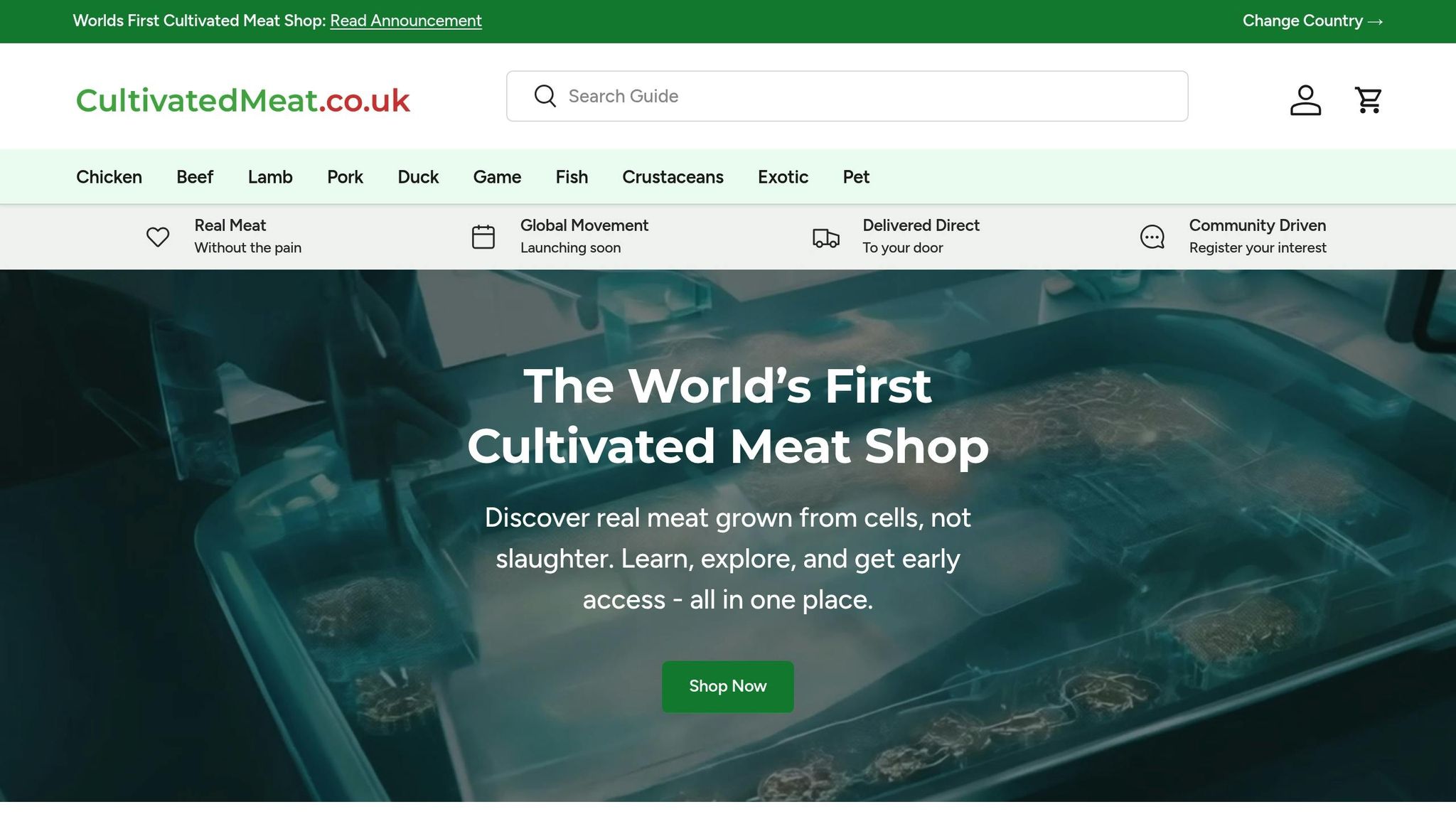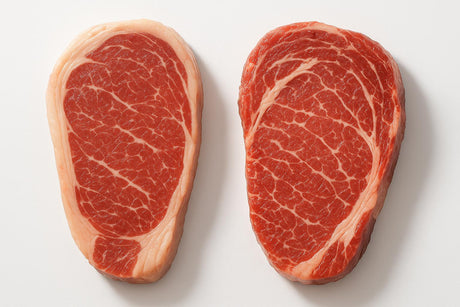Cultivated meat is reshaping the future of food, offering real meat grown from animal cells without farming or slaughter. Staying informed about its progress is key, especially as regulatory approvals and market availability evolve.
Here's what you need to know:
- Global Progress: Singapore, the US, Australia, and Israel already allow limited sales. The UK and EU are still reviewing approvals, with UK availability unlikely before 2026.
- Challenges: High production costs and regulatory hurdles are slowing widespread access.
- UK Status: Only pet food has been approved so far; human consumption is still under review.
- Stay Updated: Use platforms like Cultivated Meat Shop for product previews, waitlists, and news. Follow regulatory updates from the Food Standards Agency (FSA) and European Food Safety Authority (EFSA). Social media and industry events also provide timely insights.
Want to be among the first to try cultivated meat? Sign up for waitlists, track regulatory updates, and explore tasting events when available. This industry is growing fast - be ready to experience it as it arrives in the UK.
2024 State of the Industry: Cultivated meat, seafood, and ingredients
Current Cultivated Meat Availability Status
Cultivated Meat, despite receiving growing attention and investment, remains far from being a staple in shops or restaurants worldwide. For most consumers, including those in the UK, these products are simply not an option yet. Understanding where things stand today can help temper expectations for when this emerging industry might become more accessible.
The main hurdles to widespread availability include stringent regulatory processes, steep production costs, and the difficulty of scaling up manufacturing [1][2]. Regulatory bodies are still working to establish safety and labelling standards, while companies grapple with the technical and financial challenges of producing Cultivated Meat in volumes and at prices that can rival traditional meat.
UK and Europe: Current Regulatory Status
As of late 2025, no Cultivated Meat products have been approved for sale to consumers in the UK or the European Union [1][5]. This means British and European consumers won’t find these products on supermarket shelves or restaurant menus just yet. Both the UK’s Food Standards Agency (FSA) and the European Food Safety Authority (EFSA) are still in the process of developing the necessary frameworks to evaluate and approve Cultivated Meat. Experts predict that, at the current pace, approval for human consumption in the UK is unlikely before 2026 [3].
Interestingly, there has been one breakthrough in the UK, though not for human food. In July 2023, the UK approved Cultivated Meat for use in pet food. Meatly became the first company to secure approval for cultivated chicken for pets, though this approval explicitly excludes human consumption [5]. While limited to pet food, this milestone shows that UK regulators are engaging with the technology, even if human applications remain under review.
In the EU, progress has also been cautious but noteworthy. The Netherlands became the first EU country to allow taste testing of Cultivated Meat in July 2023 [5]. These taste tests are part of research efforts rather than commercial sales, but they serve to raise public awareness and provide valuable feedback for regulators. Both the UK and EU are prioritising a science-based, thorough approach, ensuring that safety and labelling requirements are carefully developed before these products hit the market [1][3]. While this method may delay availability, it aims to build consumer trust when the products do become accessible.
Global Approvals and Market Progress
Outside the UK and Europe, a few countries have made strides in bringing Cultivated Meat to market. As of 2025, Singapore, the United States, Australia, and Israel have granted approvals for limited commercial availability [1][5].
Singapore took the lead as the first nation to approve Cultivated Meat, with Eat Just’s chicken bites receiving the green light in December 2020 [5]. Since then, other companies like GOOD Meat and Vow have also gained approval, making Singapore the most advanced market for Cultivated Meat.
In the United States, several products have earned approval, including cultivated chicken from GOOD Meat and UPSIDE Foods, salmon from Wildtype, and pork fat from Mission Barns [1]. However, these products are only available in select restaurants and limited retail locations, rather than being widely distributed.
Australia has approved cultivated quail from Vow, while Israel granted approval for cultivated beef by Aleph Farms in early 2024 [5]. Switzerland is also emerging as a potential player, with applications currently under review.
Here’s a quick look at the current state of approvals:
| Region | Human Consumption Approval | Notable Products/Companies | Regulatory Status (2025) |
|---|---|---|---|
| Singapore | Yes | Eat Just, GOOD Meat, Vow | Approved, limited retail |
| United States | Yes | GOOD Meat, UPSIDE Foods, Wildtype | Approved, limited retail |
| Australia | Yes | Vow (quail) | Approved, limited retail |
| Israel | Yes | Aleph Farms (beef) | Approved, early stage |
| UK | No | Meatly (pet food only) | Under review, pet food only |
| EU | No | – | Under review, taste testing only |
For now, most of these products are available only in select restaurants or through small-scale retail trials, often at premium prices.
While global progress offers hope to UK consumers eager to try Cultivated Meat, it’s clear that widespread availability in British shops and restaurants is still years away. Staying informed about these developments will help manage expectations as the industry continues to evolve.
Using Dedicated Platforms for Product Updates
With Cultivated Meat launches set to reshape the food industry, staying informed has never been more important. Instead of scouring countless news articles and industry reports, specialised platforms offer a simpler way to keep track of developments. These resources gather essential updates on product launches, regulatory changes, and industry trends all in one place.
The Cultivated Meat market is projected to grow from £0.19 billion in 2024 to £0.23 billion in 2025, reflecting a 19.9% annual growth rate [7]. With such rapid expansion, these platforms become indispensable for staying on top of new products and availability.
How Cultivated Meat Shop Keeps You Updated

Cultivated Meat Shop stands out as the world’s first consumer-focused platform dedicated exclusively to Cultivated Meat products and related information. It’s more than just a news source - it’s a hub for education and preparation as these products edge closer to availability in the UK.
"Discover real meat grown from cells, not slaughter. Learn, explore, and get early access - all in one place."
The platform simplifies the process of staying informed by organising its content into key categories. Its product preview sections feature a curated selection of upcoming Cultivated Meat products, including options like chicken, beef, pork, lamb, seafood, game, exotic meats, and even pet food. Each category dives into details like taste, nutritional benefits, and the environmental impact of the products.
What sets Cultivated Meat Shop apart is its focus on the UK market. It offers regular updates on regulatory progress with the Food Standards Agency, expected launch timelines for British consumers, and insights into local market trends. This tailored approach saves you from wading through irrelevant global news, ensuring you only see updates that matter to you.
Additionally, the platform includes a timeline checker, which estimates when specific products like chicken or beef might become available in different regions. This feature allows you to plan ahead and register your interest accordingly [8]. Other sections, such as 'Insights & News', keep you informed about the latest industry and regulatory advancements, while the "Guides" section breaks down the science behind Cultivated Meat in easy-to-understand terms.
Joining Waitlists and Staying Ahead
One of the best ways to ensure you're among the first to access new Cultivated Meat products is by registering your interest on dedicated platforms. Cultivated Meat Shop’s 'Register your interest' feature is prominently displayed, connecting users with early notifications about launches, exclusive tasting events, and priority updates on regulatory progress.
Waitlist members often gain early access to product launches and exclusive tasting opportunities. For example, similar platforms have hosted tasting events and retail previews in markets like Singapore and the US, with invitations typically sent first to waitlist members and subscribers [4][5]. When signing up, you can tailor your preferences by selecting specific protein types to receive updates that align with your interests. This also introduces you to a community of like-minded individuals passionate about sustainable food solutions.
With consumer awareness of Cultivated Meat in the UK remaining steady between October 2024 and April 2025 [9], joining these early notification systems gives you a clear advantage. By being proactive, you’ll be ready to explore these products as soon as they hit the shelves, while staying informed about the latest news and regulatory updates. This approach ensures you’re ahead of the curve in embracing this exciting food innovation.
Following News and Industry Updates
Staying informed about the evolving Cultivated Meat industry isn't just about following one or two sources. While platforms like Cultivated Meat Shop provide curated updates, keeping tabs on a variety of news outlets, regulatory announcements, and expert commentary ensures you don’t miss key developments. The industry is dynamic, with updates emerging from diverse areas such as regulatory bodies, technical publications, and social media.
Trusted News Sources for Cultivated Meat
For reliable and in-depth coverage of the Cultivated Meat sector, Vegconomist and Protein Production Technology are standout choices[4][3]. These publications are well-regarded for their timely reporting on product launches, regulatory shifts, and company updates that directly impact consumers in the UK.
Vegconomist excels at making complex industry developments easy to understand. Their interviews with industry leaders and detailed market analyses often highlight new product announcements and regulatory milestones, offering valuable insights into when products might hit the shelves.
Meanwhile, Protein Production Technology dives deeper into the technical and commercial aspects of the industry. From production scaling and cost reduction strategies to manufacturing partnerships, this publication provides a behind-the-scenes look at the factors shaping the availability of Cultivated Meat.
Both outlets offer dedicated sections for Cultivated Meat, complete with newsletter options. Subscribing to these ensures you receive weekly or monthly updates straight to your inbox, so you don’t have to sift through broader food industry content. Alongside these, monitoring updates from regulatory bodies is equally essential.
Tracking Regulatory Updates
Regulatory approvals often determine when Cultivated Meat products become available to consumers. In the UK, the Food Standards Agency (FSA) and the European Food Safety Authority (EFSA) play a central role in this process[3].
The FSA's website features a section dedicated to novel foods, including Cultivated Meat. Here, you can track the status of product applications, ongoing assessments, and public consultation opportunities. Subscribing to FSA email alerts ensures you’re notified of key updates, such as approval decisions or new guidelines.
Similarly, EFSA provides detailed updates on safety assessments and regulatory frameworks that influence product availability across Europe. Their scientific opinions and approval announcements often shed light on the broader European market. Signing up for EFSA newsletters or following their social media accounts can help you stay informed about these developments.
Both agencies typically release updates after significant milestones, such as the submission of new products or the completion of safety reviews. Keeping an eye on these official channels ensures you’re getting accurate and verified information.
Social Media and Industry Experts
Social media platforms like Twitter (X) and LinkedIn are invaluable for real-time updates from industry insiders. Cultivated Meat scientists, company executives, and analysts frequently share breaking news, research findings, and commentary on these platforms[2]. These insights often surface before they’re picked up by mainstream media.
Notable figures to follow include Dr. Liz Specht from The Good Food Institute and Bruce Friedrich, both of whom regularly post about regulatory updates, industry challenges, and emerging research[1][4]. Executives from companies like GOOD Meat and UPSIDE Foods also share updates on product developments, regulatory progress, and upcoming events.
For example, in 2025, news about UPSIDE Foods’ legal challenge to Florida’s Cultivated Meat ban first appeared on Twitter, shared by company executives and legal experts days before traditional news outlets covered the story[4]. Similarly, early information about the "Bites from the Barn" tasting series was shared by organisers and industry insiders on LinkedIn before official press releases[4].
Following hashtags like #CultivatedMeat can provide a broader stream of updates, while company-specific accounts often highlight product launches and milestone achievements. However, it’s important to cross-check social media posts with official sources, as these platforms can sometimes include unverified claims. Using social media alongside trusted publications and regulatory updates creates a well-rounded approach to staying informed about this exciting industry.
sbb-itb-c323ed3
Attending Events and Tastings
Getting hands-on experience with Cultivated Meat takes your understanding beyond mere online updates. Events and tastings let you not only sample these products but also connect directly with the people behind their development. Here’s how these experiences can enrich your journey into the world of Cultivated Meat.
Food Expos and Public Tastings
European food exhibitions like Future Food-Tech, Food Matters Live, and IFE London often showcase Cultivated Meat through demonstrations, panel discussions, and product samples[3][2].
In July 2023, the Netherlands became a trailblazer in public taste testing, opening doors for broader European participation[5]. Dutch companies teamed up with research institutions to host live demonstrations and sampling sessions, inviting key figures like policymakers and journalists to experience the products firsthand.
Switzerland soon followed with an even bolder initiative. In December 2024, the Cultured Hub in Kempthal was launched as a partnership between Migros, Givaudan, and Bühler Group. This facility regularly hosts tastings and workshops, offering a deeper dive into the Cultivated Meat landscape[5].
These events are more than just tastings - they provide valuable insights into product launch timelines, upcoming regulatory milestones, and even exclusive waitlist opportunities. You might even get a sneak peek at when these products could hit UK shelves[3].
For those looking to keep track of such events, Cultivated Meat Shop serves as a handy resource, curating information about expos, tastings, and other opportunities across Europe. It’s an excellent way to discover events worth attending, and it often complements the early access and waitlist options available on their platform.
If attending in person isn’t feasible, don’t worry - online events have got you covered.
Online Events and Webinars
Online events bring Cultivated Meat education right to your doorstep. Companies, industry groups, and platforms like Cultivated Meat Shop frequently organise webinars, virtual tastings, and Q&A sessions, all accessible from anywhere in the UK[3].
These events typically cover a range of topics, including product updates, industry trends, regulatory progress, and discussions around sustainability. Many feature live Q&A sessions with industry experts, giving you the chance to engage directly with those shaping the field[2][3]. Formats can vary widely, from formal presentations to interactive cooking demos.
One particularly exciting development is virtual tastings. Some companies are experimenting with sending product samples by post to registered participants, followed by guided online tasting sessions. While this is still in its early stages for Cultivated Meat due to regulatory hurdles, it’s becoming more common in similar food innovation events.
You can register for these events through company websites, newsletters, or social media. Cultivated Meat Shop also serves as a central hub, aggregating upcoming webinars and virtual events so you don’t have to keep track of multiple sources.
These online sessions are an excellent way to ask direct questions about product availability and timelines, especially for UK consumers. While in-person tastings remain limited for now, virtual events offer immediate access to the latest updates and a chance to engage with the innovators driving the future of Cultivated Meat.
Comparing Different Information Sources
Information channels vary in how quickly they deliver updates, their accuracy, the level of detail they provide, and how easily accessible they are. Understanding these differences is key to crafting a smart plan for staying informed. This section breaks down the strengths and weaknesses of each channel, helping you decide which ones meet your need for timely and reliable updates.
Information Channel Comparison
When it comes to staying updated on Cultivated Meat, there are four main sources to consider. Each serves a unique purpose, depending on what you're looking for. Dedicated platforms like Cultivated Meat Shop focus on consumer needs, offering curated content and direct access to opportunities like waitlists. Mainstream news outlets cover the broader industry but may not dive deep into specifics relevant to UK shoppers. Social media is fast-moving and great for real-time updates but often requires extra effort to verify accuracy. Lastly, regulatory sources provide official, highly reliable information but often use technical language that can be challenging to interpret.
| Information Channel | Accuracy | Update Frequency | Detail Level | Accessibility | Best For |
|---|---|---|---|---|---|
| Cultivated Meat Shop | High (curated) | Frequent | High | Very high | Product launches, waitlists, education |
| Mainstream News Outlets | Moderate-High | Moderate | Moderate | High | Industry news, regulatory milestones |
| Social Media/Industry Experts | Inconsistent | Very high | Inconsistent | Very high | Rapid updates, community discussion |
| Regulatory/Government Sites | Very high | Low-Moderate | High (technical) | Moderate | Official approvals, legal status |
Cultivated Meat Shop is particularly strong at simplifying complex industry developments into practical advice for UK consumers. It provides detailed previews of products, taste profiles, and health information - details you won't usually find in mainstream news. Its waitlist and educational resources also provide actionable insights for those eager to try new products.
Mainstream news outlets are a solid choice for tracking market trends and significant regulatory updates. However, they often lack the consumer-focused details that help with practical decisions, like taste or where to buy locally. Their coverage tends to centre on big announcements rather than the finer details.
Social media platforms, including X, Instagram, and LinkedIn, often break news first, especially during live events or major announcements. Industry insiders frequently share behind-the-scenes updates that you won't find in formal press releases. That said, the quality of information can vary widely - ranging from expert commentary by food scientists to speculative posts. It's important to sift through the noise and identify credible sources.
Regulatory sources, such as the Food Standards Agency and the European Food Safety Authority, are the ultimate authority for official information. They publish detailed safety assessments and approval decisions, which are legally binding. These updates are essential for understanding when Cultivated Meat products can legally enter the UK market. However, they often come out weeks or months after initial announcements and require patience to interpret.
A smart way to stay informed is to mix and match these sources. Start with Cultivated Meat Shop for consumer-focused updates and waitlist opportunities. Add trusted news outlets for broader context, keep an eye on regulatory agencies for official approvals, and selectively follow social media for real-time developments. This balanced approach ensures you get accurate information quickly while staying ready to act on new opportunities.
No single source covers everything. Regulatory sites won't tell you how products taste, social media won't always reflect official timelines, and mainstream news rarely offers direct access to waitlists or early purchasing options. By understanding the strengths and limits of each channel, you can create an information strategy that keeps you ahead of the curve as Cultivated Meat products become available in the UK. A multi-channel approach ensures you're informed and ready when the next big update hits.
Conclusion: Staying Informed About Cultivated Meat
Keeping up with the latest in cultivated meat requires a smart and flexible approach to gathering information. With the market projected to grow from £0.18 billion in 2024 to £0.22 billion in 2025 [7], staying ahead of the curve can give UK consumers an edge. This growth highlights the importance of having a reliable strategy to stay informed.
One effective way to stay updated is through platforms like Cultivated Meat Shop, which provides timely updates and exclusive previews. Their "Insights & News" section is particularly useful for UK-specific updates, offering insights into taste profiles, ethical certifications like the C-Label, and regulatory developments that will determine when these products hit British shelves.
In addition to this, keeping an eye on regulatory updates from the Food Standards Agency can provide clarity on approval timelines. Following industry experts on social media is another great way to get real-time updates during major announcements. Don’t forget about events - exclusive tasting opportunities like "Bites from the Barn" have already offered early glimpses into this emerging market [4].
It’s also worth noting that restaurants and food service providers are likely to adopt cultivated meat before it becomes widely available for home cooking [6]. This means dining out might be your first chance to try these products, making it valuable to follow both consumer-focused platforms and hospitality industry news for early opportunities.
With cultivated meat already on the market in places like Singapore, the US, and Australia, and regulatory reviews progressing across Europe, the UK is inching closer to a breakthrough [1]. Staying informed now ensures you’ll be ready to act as soon as approvals are finalised.
As the market evolves, so should your information-gathering strategy. Start by focusing on regulatory updates and waitlists, and later shift to tracking product details and market entry points. By setting up these information channels now, you’ll be well-prepared to move from anticipation to enjoying this new food revolution.
FAQs
What is delaying the availability of cultivated meat in the UK and Europe?
The journey to make cultivated meat available in the UK and Europe comes with its fair share of challenges. A key obstacle lies in navigating the intricate regulatory approval process. Before cultivated meat can hit the shelves, it must pass stringent safety and quality checks conducted by regulatory authorities. This thorough evaluation ensures the product is safe for consumers but can take considerable time.
Another significant challenge is scaling up production to meet potential consumer demand. Producing cultivated meat on a large scale isn't straightforward - it requires substantial investment in advanced facilities and cutting-edge technology, much of which is still under development. However, despite these hurdles, progress is steadily being made, and it's likely that cultivated meat will become more widely available in the near future.
How can I stay informed and be among the first to try cultivated meat in the UK?
To keep yourself in the loop, consider signing up for waitlists and product previews on Cultivated Meat Shop. Their platform keeps you updated on the newest advancements, so you’ll know when products become available and their expected launch dates.
They also offer a wealth of educational content, where you can dive into everything about cultivated meat - its advantages and what it could mean for the future of food. Staying connected means you'll be ready to explore this groundbreaking food category as soon as it hits the shelves in the UK.
How can I stay updated on the latest news and availability of cultivated meat?
To stay informed about the latest developments and availability of cultivated meat, it’s a good idea to follow reliable sources that focus on food innovation and biotechnology. One such resource is Cultivated Meat Shop, which provides educational articles, previews of upcoming products, and even waitlist options to keep you in the loop about this emerging food category.
Additionally, keeping track of updates from official UK regulatory bodies, such as the Food Standards Agency (FSA), is crucial. They offer information on approvals and safety standards, helping you stay updated on when cultivated meat might hit the shelves near you. Staying connected with these trusted sources ensures you won’t miss out on any important news.












